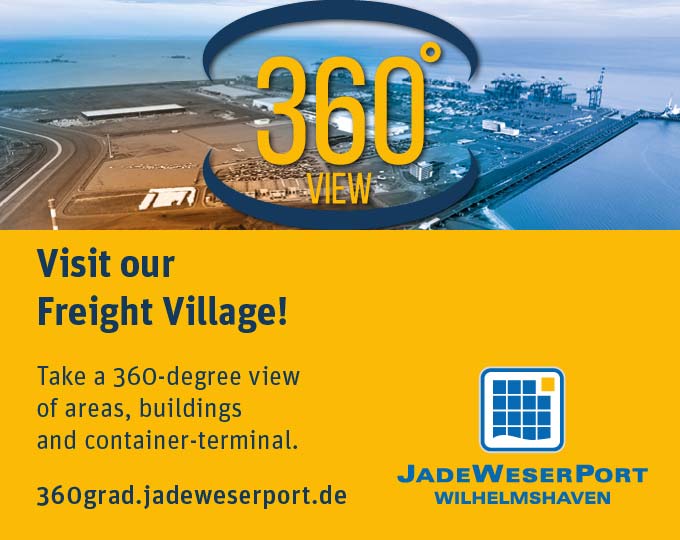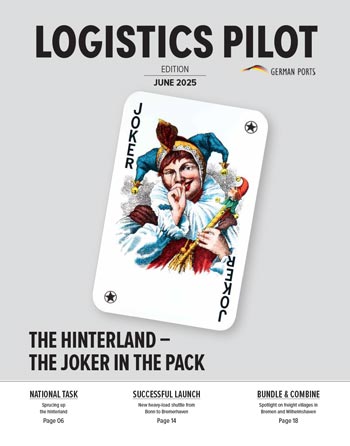J. Müller is closely linked with Lower Saxony’s second largest port in Brake. But Bremen is another important location for the family-run company. The fact that the port and logistics service provider has a large, diversified portfolio may be one of the reasons it can now look back on 200 years of traditional service.
Photos: J. Müller/SKYPIC MEDIA/JANA WEBER PHOTOGRAPHY, J. Müller/Heide Pinkall
2021 is a very special year for the hidden champion: J. Müller celebrated its 200th birthday in May. There are many reasons to celebrate. The most important: The long-standing company is one of the oldest family-owned port operators in Europe, and is likely to maintain this position. But even without its long history, the company is a specialised institution in the transshipping, storage and distribution of agricultural, bulk and general cargo as well as project loading. The company’s Board Chairman Jan Müller, the sixth-generation head of the company, explains what this means on a tour of the facilities in Bremen in Brake:
The coffee terminal at Bremen’s wood port
“We always like showing visitors our trimodal terminal with the coffee silo facility,” Müller says, adding, “Most people have a special relationship with coffee and find the logistics behind it exciting.” As one of the hubs for global coffee trade, J. Müller has much to offer in this regard: the services that the company provides for this popular bean include inspection of the goods that arrive in Bremen’s wood port in containers via domestic ship, train or lorry.
“We transship around 300,000 tonnes here every year,” Müller says. The goods are thoroughly inspected and then sampled as per the customer’s request. If the beans cannot be forwarded in sea containers, they are unloaded, weighed and then put in storage. “Our customers can and must be able to rely on the quality. So we measure the temperature and moisture, and publish this information online.” Other actions are then taken by request, such as enriching or loading.
The needs of potential new customers are also thoroughly evaluated and analysed. “We’re always working on optimising processes and investing further at the coffee terminal,” emphasises Müller. And so, he says, it’s good that all transshipping, enriching, storage and transport logistics processes are interlinked, helping ensure seamless processes.
Facts
Consortium J. Müller
Founded: 1821
Locations: Brake (head office) and Bremen
Fields of business: Operating seaport terminals, as well as all port and shipping services
Product groups: Cereals, feeds, fertilisers, lumber products, iron/steel, wind power and industrial systems, heavy-duty products, coffee and other bulk/general cargo
Owner-operated fleet: 30 domestic ships
Transshipment: 6 million tonnes of general and bulk cargo (2020)
Revenue: 105 million euros (2020)
Employees: 479
J. Müller transships around 300,000 tonnes of coffee in Bremen every year.
The Niedersachsenkai in Brake
The Niedersachsenkai, with its lumber products hub at the Brake Seaport, is especially important to J. Müller. “We started operating two new warehouses with a total space of about 28,000 square metres in 2020,” says Müller. The warehouses mainly store wood pulp. With over one million tonnes of transshipment per year, the company is the largest importing port in Germany for this paper production material. Around half of this is transported to the European hinterland by train. “We benefit from a good train connection that lets us reach most destinations in Europe by feeder track within 48 hours,” says the chairman.
But there is more: The first direct train with 1,000 tonnes of wood pulp destined for Chongqing, China in 2020 was a very special event. “The Silk Road was another quick and, most importantly, eco-friendly route for transports to Central China,” says Müller. Both Asia and the countries of the former USSR are particularly attractive growth markets for selling wood pulp. When it comes to transshipping these lumber products, the company stands out for its 50 years of experience in this segment: “We know exactly how to store and handle wood pulp and paper. For example, we’ve equipped facilities that handle these with a flooring that was specially designed for storing paper,” Müller explains.
The agricultural and heavy-duty terminal in Brake
The agricultural and heavy-duty terminal is also located in Brake. The seaport, with its geographically favourable location, can handle cereals and feed products as an interface between global logistics streams and in the immediate vicinity of the northwestern German finishing industry. There is a trimodal connection here as well: road, rail and maritime.
“We transship around four million tonnes of agricultural goods here,” says Müller. “By purchasing the cereal facilities in Bremen five years ago we were able to siginificantly expand our capacity once again.” J. Müller in Brake also boasts Europe’s largest contiguous silo system, where 20,000 tonnes of agricultural goods can be cleared every day. The storage facilities’ dimensions at both locations are also somewhat larger, comprising a total of about 630,000 tonnes in Bremen and Brake.
Last but not least, the company offers a wide range of services for agricultural products. These include product processing – drying, aspiration, breaking, grinding and crushing – as well as separate handling and storage of GMO-free (genetically unmodified) and ecological products such as fertilisers and feed additives. “These services are already automated, but at the agricultural terminal we want to expand the digital structures,” notes Müller. “After all, our guiding principle is: “Maintaining values – embodying change.” This is the motto that will carry J. Müller into the next 200 years. (cb)







